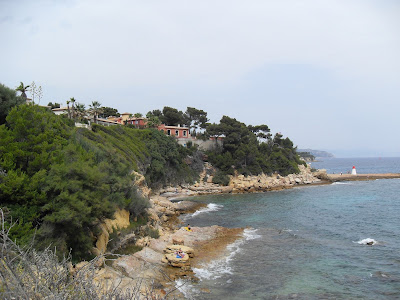 |
| a beach on the Mediterranean coast |
This post
is going to be primarily informative about the quirks of summer vacation in
France, including the common dates, weather, and other relevant details. First,
a little lexique:
Language:
canicule -extended heat wave
bison futé - the 'smart bison' path for car travel, which
basically alerts you to the severity of traffic jams in different areas using
colors as an indicator (black = heavy traffic jams, green = free flowing traffic)
bouchon - traffic jam (also the work for 'cork' as in
a wine cork)
juilletiste/aoûtien - Julyists and Augustists, words French people
can use to describe those who go on vacation in July, and those who prefer to
go in August
Dates:
The first
thing you need to know about France: since the school system is centralized,
summer vacation is between July and August, in June school is still in session.
The start of the vacation season is literally at the end of the school year.
There are 2
bank holidays in July and August. Not surprisingly, these tend to be the
biggest travel periods. The first is July 14, France's Bastille Day and the
equivalent of our Independence Day. The other is August 15, or l'Assomption
(the Assumption of Mary in English). This Catholic holiday is observed by many
European countries, including also Italy and Spain.
As I've
stated in earlier posts, France essentially shuts down in the month of August
(insert link here). Stores that do not
completely close will often take a four-hour lunch break instead of two, or
entire offices will close for two weeks.
Having
experienced it, I can say that the month of August can be refreshing. Depending
on your sector of work, you can basically assume that most people will be on
vacation. In other words, the fact that many offices and work
places are closed really gives people license to take their vacation at this time. On the other hand, if you need to see your doctor, or take care of certain papers, it can be difficult to do in August.
 |
| another view of the Mediterranean coast, near Marseille |
Places:
During the
summer the most common vacation destination are beaches. This also means that
everyone is heading in more or less the same direction at the same time (see
the next paragraph about traffic jams). The chic place to go within France is
obviously somewhere along the Mediterranean. However, many French people also
like the Atlantic coast, which provides sometimes cooler weather, larger
beaches, and smaller crowds. Those who don't go to the beaches will often
prefer the cooler landscape of the mountains, for hiking and other activities. In
any case, the majority of the population heads either south (for beaches) or
east (for mountains).
Major Traffic Jams:
Throughout
July and August, weekends are packed, as the roads towards the beaches become
clogged, and the trains become annoyingly expensive.
I had the
experience one weekend in August of seeing holiday weekend traffic with my own
eyes. I was heading by car from Lyon to the South in the direction of
Marseille. A trip that should have taken about 3 hours by car took
7. This was not because of construction, nor because of an accident on
the road. This traffic jam was simply caused by the fact that there were so
many like-minded vacationers on the road at the same time, that there just
wasn't enough space to accommodate them. This is when I understood that
vacation time is great and extended in France, but also means a certain level
of organization to avoid the huge crowds of people moving in the same places at
the same times.
During this
experience I also learned that there are frequent radio reports about the
suggested travel times (leave before 10 am, or after 9 pm), and descriptions of
the length of 'bouchons'.
Interestingly,
bouchon in French is also the word for cork, as in the cork used to bottle
wine. If anything, I guess it's more romantic to say you are stuck in a 'bouchon'
than stuck in a traffic jam!
Weather:
France has
a continental climate, but it's also generally milder than what I know from the
Midwest in the US. The summers are hot, but not as humid as what I'm used to.
Anyone
spending the summer here can expect little to no air-conditioning, at least in
private homes. When there is an extended heat wave without breaking a certain
temperature, this is called a canicule.
France suffered badly from one of the these in 2003 and many people died as a
result of poor preparation. Now the 'alerte canicules' are very well-advertised
and taken seriously. Unfortunately we've already had one almost weeklong canicule
with several days of 100 degree weather (40 C) this summer.
Summer is the time to celebrate:
The French
are also great at celebrating summer, with festivals of all kinds, all over the
country. One of the most famous festivals is the theater festival held in
Avignon in July.
What I also
appreciate is that small, otherwise not as well-known cities can also host very
famous festivals. For example, the city of Aurillac, a city of 27,000 people in
central France, hosts a very well-known street theater festival. The same goes for the city of Angoulême and
its winter comics festival.
Happy
summer to everyone!
Comments
Post a Comment